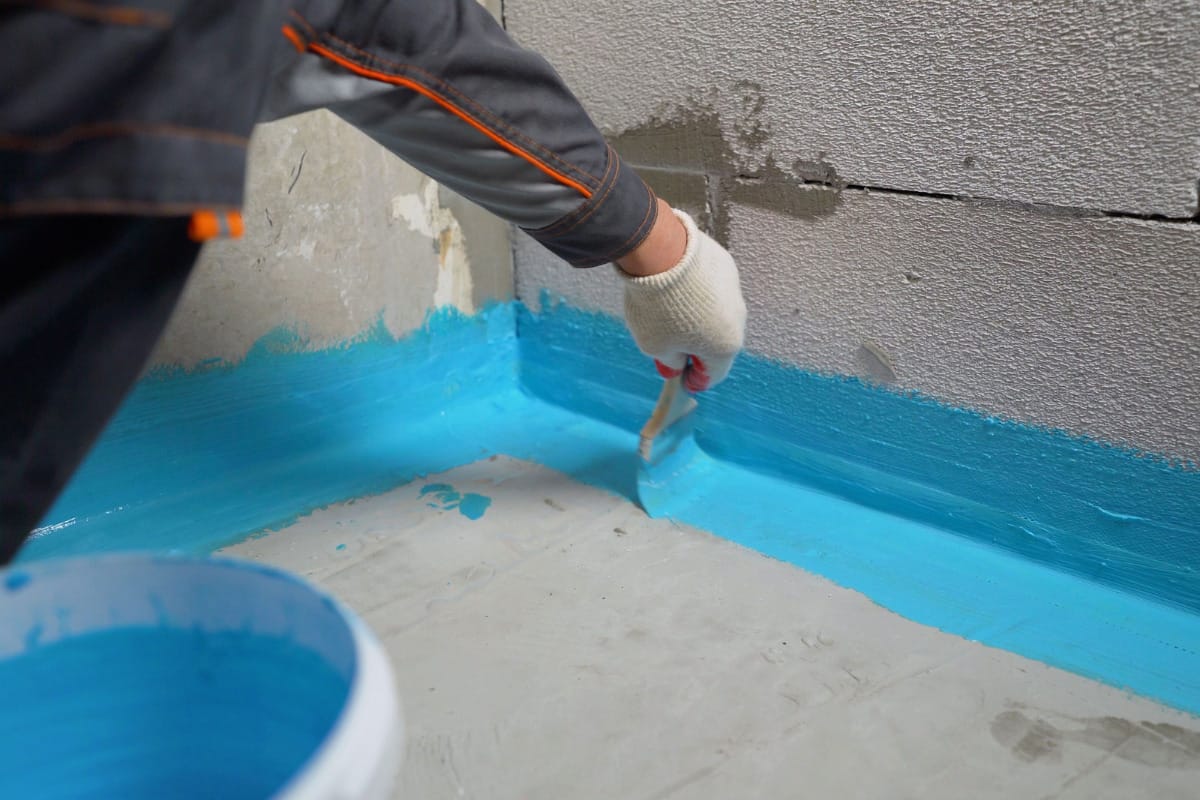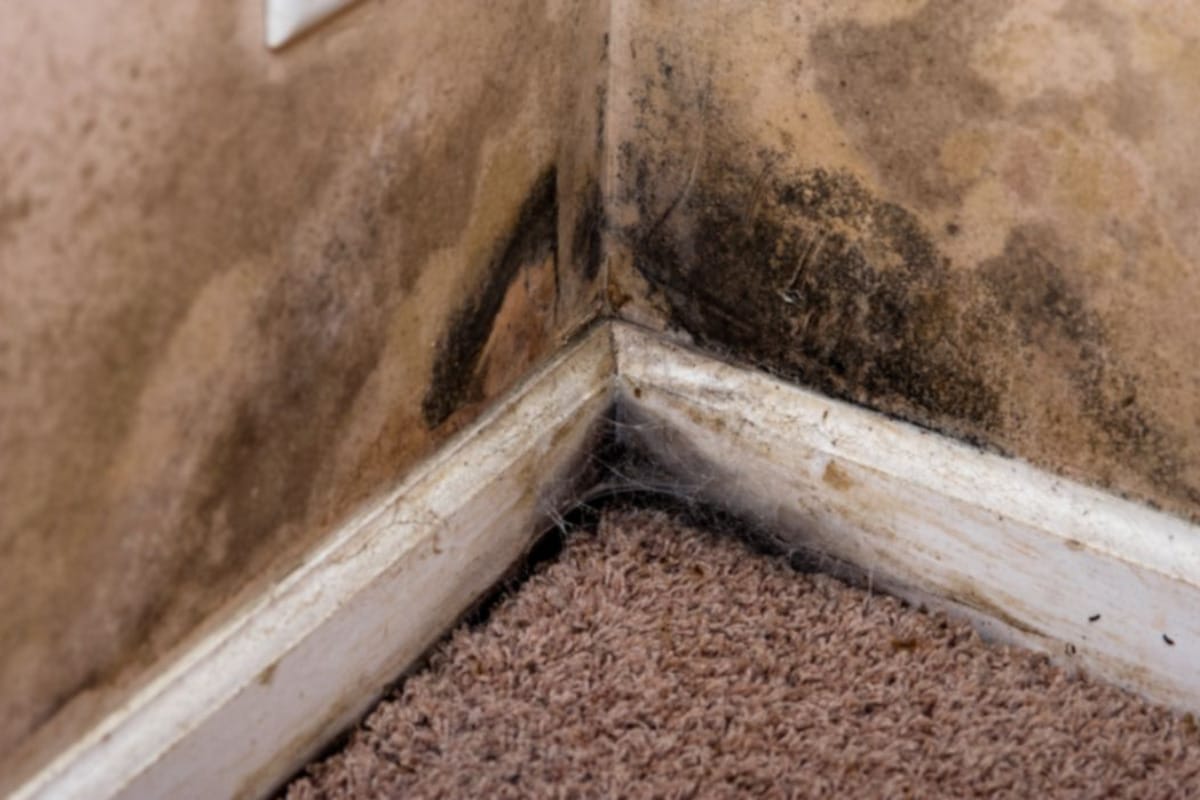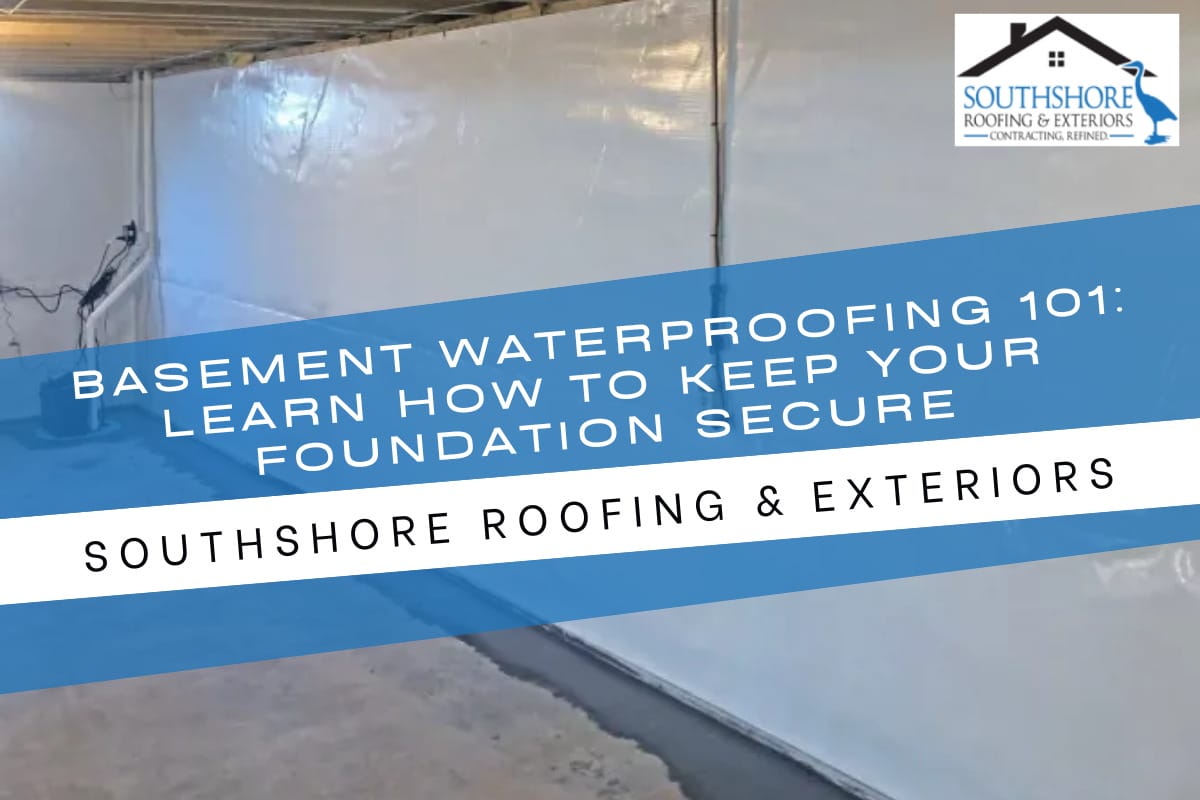At SouthShore Roofing & Exteriors, not only is our primary focus to offer great home improvement services in Tampa but also to make homeowners aware of how they can take care of their property.
We often talk about improving the roof of your home, but today we will discuss the foundation. Having a good foundation is the cornerstone of a stable home, but over the years it can suffer some damage.
If you worry about potential water damage in your basement, you’re not alone. Many homeowners face the same concern, which is why basement waterproofing is so important. That’s why today, we will discuss the importance of basement waterproofing and how it can protect your foundation from potential water damage. We will also address common concerns that homeowners have, why taking preventative measures is crucial, and discuss the different waterproofing techniques available.
What Is Basement Waterproofing?
Waterproofing your basement is a vital aspect of home maintenance that is often overlooked until problems arise. You see, your basement is a crucial part of your home’s foundation and a lot depends on it being in good condition.
Basement waterproofing is a specialized process designed to safeguard the foundation of your home against water infiltration and moisture-related issues. This crucial, preventive measure involves various techniques and materials aimed at creating a protective barrier between your basement and the external elements.

Understanding the Importance of Basement Waterproofing
Imagine a strong fortress standing tall, its foundation waterproof, ensuring the safety and security of everything within. This image perfectly illustrates the importance of basement waterproofing.
When it comes to protecting your home, it’s important to focus on your foundation. Without a strong and secure foundation, the entire structure is at risk. And the biggest threat to a home’s foundation is water damage.
Water can seep into the basement through cracks in the walls or floor, causing damage to the structure and potentially leading to mold growth. Basement waterproofing acts as a barrier, preventing water from entering the foundation and keeping it dry and secure.
Here are some of the other advantages of waterproofing your basement and home:
Preservation of Structural Integrity
It is clear that a waterproof basement will protect the foundation of your home, but it also helps to maintain the structural integrity of the entire house. When water infiltrates the foundation, it can weaken the concrete and compromise the stability of a building. This can lead to cracks in the walls, sagging floors, and even structural collapse in extreme cases.
Long-Term Health and Safety Investment
Additionally, basement waterproofing can also improve the indoor air quality of your home. When water enters the basement, it creates a damp environment that is ideal for mold and mildew growth. These allergens then circulate throughout the house, causing respiratory issues and other health problems. By keeping the basement dry and free from moisture, basement waterproofing helps to create a healthier living environment for you and your family.
Increase in Value of Your Home
When potential buyers assess a property, they look for signs of a well-maintained structure. A waterproof basement not only assures them of the property’s current condition but also indicates your commitment to its long-term health. This added assurance can influence their decision positively, making your home a more attractive and valuable investment.
Assessing the Condition of Your Foundation
While we do pay attention to how our interiors look and whether they match the latest trends or not, we generally forget to pay a visit to the basement too. In the following sections, we describe some of the signs that you need to look for as they signal that it’s time to waterproof your basement in Tampa.
Cracks and Damage: Start your assessment by inspecting the walls, floors, and areas around windows and doors for visible cracks. These cracks can serve as pathways for water, indicating potential foundation issues.
Bulging or Bowing Walls: Look out for any signs of bulging or bowing in the walls, as these can signal structural stress. Such deformities often result from pressure against the foundation, potentially compromising its stability.
Mold and Mildew: Pay attention to unusual odors or the presence of mold and mildew. These indicate excessive moisture, which can weaken the foundation over time. Mold growth not only points to a moisture problem but also poses health risks to occupants.
Checking Drainage Systems
Sump Pump Functionality: Verify that your sump pump is in good working condition. A malfunctioning sump pump can lead to water accumulation in the basement, creating a conducive environment for foundation damage and mold growth.
Gutters and Downspouts: Inspect your gutters and downspouts to ensure they are clear of debris. Properly functioning gutters channel water away from the foundation, preventing pooling around the base of your home.
By thoroughly assessing the condition of your foundation and its surrounding drainage systems, you can identify potential issues and take the necessary steps to address them, ensuring the long-term security and stability of your home.

Exploring Different Waterproofing Techniques
Discover the various techniques available to effectively safeguard your basement against water damage.
Exterior Waterproofing: Fortifying Your Basement’s Defenses
When it comes to safeguarding your basement against water damage, one of the most robust methods available is exterior waterproofing. This highly effective technique involves excavating the soil surrounding the foundation and applying a waterproof coating to the exterior walls. This specialized coating acts as a formidable barrier, preventing water from seeping into the basement. Additionally, a drainage system is strategically installed to divert water away from the foundation. This comprehensive approach is ideal for preventing water intrusion, and ensuring your basement remains consistently dry and secure.
Interior Waterproofing: A Cost-Effective Alternative
Alternatively, interior waterproofing is another viable technique. This method involves the installation of a waterproof barrier on the inside of the basement walls. This barrier can manifest as a waterproof membrane or a sealant meticulously applied directly onto the walls.
An important part of interior waterproofing is the incorporation of a drainage system, often in the form of a sump pump, designed to efficiently remove any water that manages to infiltrate the basement. Interior waterproofing, while highly effective, is often more budget-friendly than its exterior counterpart. It becomes a practical choice when exterior access is limited or if the water intrusion is minimal.
By exploring these different waterproofing techniques, you can effectively protect your basement against water damage. Whether you choose exterior or interior waterproofing, the key is to address any water issues as soon as they arise. Investing in proper basement waterproofing not only keeps your foundation secure but also provides peace of mind knowing that your basement is protected against potential water damage.
How Much Does Basement Waterproofing Cost?
When we talk about the initial cost, basement waterproofing can be expensive. The average cost of having to waterproof a basement is around $2,000 to $8,000. However, if you talk about the long term benefits (which we covered in the section above) then it’s a cost-effective choice.
How much you pay to waterproof your foundation will depend on several factors such as the following:
- Size of your basement
- Layout of your basement
- Whether you need interior or exterior waterproofing
- The contractor you hire
- Labor costs in the area
We’ve talked about the cost of basement waterproofing and the factors affecting it in a bit more detail in our blog post: How Much Does It Cost To Waterproof Your Basement?
Maintaining and Monitoring Your Waterproof Basement
Make sure that you regularly inspect and maintain the waterproofed area, as this will help you catch any potential issues early on and prevent water damage from occurring. It is important to check for any signs of moisture or leaks, such as dampness on the walls or floor, musty odors, or water stains. If you notice any of these signs, it is crucial to take immediate action to identify and fix the source of the problem. This could involve resealing cracks or applying a new waterproof coating. Additionally, it is recommended to clean the basement regularly, as dust and debris can accumulate and affect the effectiveness of the waterproofing system.
In addition to regular inspections, it is also important to monitor the overall condition of your basement. This can be done by observing any changes in the appearance or functionality of the waterproofed system. For example, if you notice any bulging or cracks along the walls, it could indicate that the waterproof membrane has been compromised and needs to be repaired. Similarly, if you notice that the sump pump is not functioning properly, it may need to be serviced or replaced. By staying vigilant and addressing any issues promptly, you can ensure that your waterproofed basement remains secure and protected from water damage.
Can I Waterproof The Basement Myself?
Waterproofing a basement is a complex and intricate task that requires specialized knowledge, skills, and equipment. While there are DIY waterproofing products available on the market, tackling this job without professional expertise can lead to inadequate protection and potential future issues.
Hiring a professional is crucial due to their:
Expertise: Professionals have in-depth knowledge of various waterproofing methods and can tailor solutions to your specific needs.
Proper Diagnosis: They can accurately identify the source of water intrusion, addressing underlying issues that DIY attempts might miss.
Quality Materials: Professionals use high-quality materials and advanced tools for long-lasting protection, unavailable in typical DIY scenarios.
Conclusion
In conclusion, basement waterproofing is a crucial step in protecting your foundation and ensuring the longevity of your home. By understanding the importance of waterproofing, and regularly assessing the condition of your foundation, you can identify any potential water issues and take appropriate measures to address them.
If you are looking for a reliable roofing contractor in the area for your project, look no further than the team at SouthShore Roofing & Exteriors. We are a trusted company when it comes to home improvement projects, and basement waterproofing is one area we excel in. We offer both exterior and interior waterproofing services in Tampa, so contact us today at (813) 400-3329.
Frequently Asked Questions
A. The cost of basement waterproofing varies depending on factors such as the size of the basement, the severity of the water issue, and the chosen waterproofing method. It can range from $2,000 to $7,000.
A. The waterproofing process typically takes several days to complete. It involves cleaning the basement, repairing any cracks, applying waterproofing materials, and allowing sufficient time for them to dry and cure.
A. Yes, there are potential risks and drawbacks associated with basement waterproofing. These can include damage to the foundation, high costs, disruption during the process, and the potential for mold growth if it’s not done properly.
A. If you notice signs of water damage in your basement after waterproofing, it may indicate a problem with the waterproofing system. Contact a professional to assess the issue and make necessary repairs.




